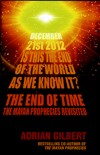The End of Time
 According to the ancient Maya, 21 December 2012 will be the end of the world as we know it. On the stroke of midnight their calendar, like the mileometer of a car, will click round to to read 0 baktuns, 0 katuns, 0 tuns, 0 uinals and 0 kins. The last time it did this was on 12 August 3113 BC over five thousand years ago.
According to the ancient Maya, 21 December 2012 will be the end of the world as we know it. On the stroke of midnight their calendar, like the mileometer of a car, will click round to to read 0 baktuns, 0 katuns, 0 tuns, 0 uinals and 0 kins. The last time it did this was on 12 August 3113 BC over five thousand years ago.
Since according to the Maya the last age and indeed the two before that ended in catastrophes, we have to ask ourselves what might happen this time. Should we take seriously their claims that this will be a time of apocalyptic cataclysm? How did the Maya, a clever but nonetheless Stone age people, calculate the date of an astronomical occurrence that was scheduled to take place many millennia in the future?
These are just some of the questions that are posed in the present book. Written in the form of a personal quest, it takes the reader on a journey round some of the major sites of Mayan interest. Interwoven with the story of this physical quest is a journey of ideas. Only recently has the written language of the ancient Maya has been decoded. This has made it possible, using computer programs, to compare dates they recorded with actual events in the sky. A new picture is emerging of the Maya as a people possessed of extraordinary knowledge concerning astronomy that without the benefit of telescopes and computers ought to have been impossible for them to know. How they may have come by this knowledge is one of the dilemmas of Mayan archaeology.
In this book Adrian addresses this seldom discussed issue, exploring the question from a multiplicity of angles. In the end he comes up with some surprising conclusions. Perhaps we are not as alone in the universe as we think.


